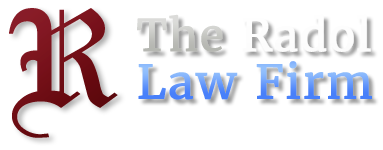Bergen County Foreclosure & Bankruptcy Attorney
Foreclosure & Bankruptcy Filing Options
If you are facing foreclosure, it is recommended that you contact your bankruptcy attorney. Your house is in jeopardy. You need the legal support of an attorney to stop the process and protect your home or prolong the process while you assess your future. If you need quality legal support from an effective and experienced attorney, contact The Radol Law Firm for a consultation.
What Is a Foreclosure?
A foreclosure is when a mortgaged home is repossessed by the lender. This happens when the homeowner begins to fall behind on their mortgage payments. The foreclosure process is a lengthy one that involves many steps. It is recommended that you schedule a consultation with your bankruptcy attorney when you receive your first notice of foreclosure. There are several measures that you can take in the meantime to try to help stop or prolong the foreclosure process. Some of the many options available to you aside from bankruptcy to avoid foreclosure include:
- Short sale
- Loan forbearance
- A deed in lieu of foreclosing.If you have already tried these methods with no success, it may be time to speak with an attorney to assess if bankruptcy is a viable option.
Delaying the Foreclosure
Once you file for either a Chapter 7 or a Chapter 13 bankruptcy, the foreclosure process comes to a halt. The court will issue an “automatic stay” to your lender which means that they have to immediately stop their pursuit of debt collections. If your home is in the process of a foreclosure sale, the sale will be put on hold through the bankruptcy process. There are only two exceptions to the process of automatic stay:
- If the foreclosure notice has been filed, most states require an advanced notice from the lender when a foreclosure is imminent.
- If there has been a motion to lift the automatic stay, it is possible for the lender to be granted a lift from the bankruptcy court. The bankruptcy and the process of going to court to lift the automatic stay will still allow you some extra time for the foreclosure, but not as much as an automatic stay will.
Filing Chapter 13 Bankruptcy and How it Can Help
By having your attorney file for Chapter 13 bankruptcy for you, you will be allowed to slowly pay off any late, unpaid payments over the course of time. Most repayment plans are over a 3 or 5-year span. However, you are not only responsible for this new repayment plan, you will still need to be able to cover your mortgage at the same time. If you are able to pay off the repayment plan over the specified amount of time, you will be able to keep your house from going into foreclosure. If you have a second or even third mortgage on your home, filing for a Chapter 13 bankruptcy could end up eliminating those payments entirely. These other mortgages could be considered unsecured debt, which is the least worrisome type of debt in a Chapter 13 bankruptcy.
Filing Chapter 7 Bankruptcy and How it Can Help
If you have to give up your home, filing for Chapter 7 bankruptcy may be the best thing for you. A Chapter 7 bankruptcy will buy you a few months to stay in the home without having to make any mortgage payments. The benefits to filing for a Chapter 7 bankruptcy are:
- It cancels all the debt related to your home.
- You will be able to stay in the home during the bankruptcy process while saving money for the future.
- You will not be held liable for taxes on certain property loans. This will not apply if you used the loan for something other than the mortgage or home improvements and if the property in question is a second home.
Why Chapter 7 May Not Benefit You
Chapter 7 bankruptcy does not benefit everyone. The two major reasons why Chapter 7 may not work in your situation are:
- You may not be eligible to file for Chapter 7 bankruptcy. Your gross income must not exceed a certain amount over a six-month period or if your current income can more than handle your living expenses.
- You will end up losing property that you may want to keep. In a Chapter 7 bankruptcy, you are facing losing some items that may hold value to you. For example, a Chapter 7 bankruptcy only allows you to have a certain monetary amount of jewelry. If it is found that you have a valuable piece, that piece of jewelry will likely be sold and given to your lenders.
Your Credit Score
Something to keep in mind is that both bankruptcy and foreclosure will have a negative impact on your credit score. A foreclosure will stay on your credit for many years and could hold you back from buying a home in the near future. Bankruptcy could have less of a negative impact on your credit score and may be a better option. By filing for bankruptcy, you are essentially wiping out your debts and starting at zero again and you will be able to rebuild your credit score over time. Bankruptcy can also give you the luxury of staying in your home for a little while longer while getting to save money for a new home at the same time. Due to the massive amounts of foreclosures and bankruptcy filings, it is likely that the regulations will be reviewed and could possibly change in the future as far as how your credit score will be impacted.
Contact Our Bankruptcy Attorney in Bergen County
Foreclosure can be devastating. Stopping the process or prolonging it can make a difference. If you are facing foreclosure, it is important to discuss your matter with a seasoned attorney. If you need our help, contact The Radol Law Firm for a consultation today.
